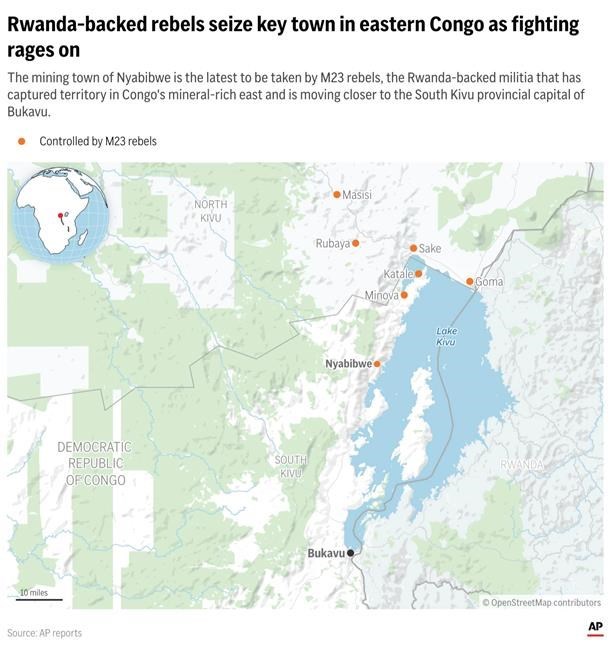
M23 rebels have claimed another town in eastern Congo. (AP Digital Embed)
Republished February 06, 2025 - 11:48 AM
Original Publication Date February 06, 2025 - 5:26 AM
GOMA, Congo (AP) — The Rwanda-backed rebels who captured eastern Congo 's key city of Goma sought to reassure its residents Thursday, holding a stadium rally and promising safety under their administration as they try to shore up public support amid growing international pressure.
The M23 rebels continued advances elsewhere in eastern Congo despite their own announcement of a unilateral cease-fire, and the U.N. secretary-general called for them to lay down their guns and agree to mediation. Health officials, meanwhile, said the rebellion had disrupted a key medical lab in Goma.
As thousands gathered at the stadium in Goma, which the rebels captured last week with the support of troops from neighboring Rwanda, M23 political leader Corneille Nangaa told the crowd that the city had been “liberated and sanitized” and that new administrative heads have been appointed.
“I ask you to sleep well because we bring you security; this is our priority,” Nangaa said. “Starting next week, the children return to school. Let all state agents return to their offices. The displaced people are returning to their homes.”
The rebels are backed by some 4,000 troops from neighboring Rwanda, according to U.N. experts. They are the most potent of the more than 100 armed groups active in Congo’s east, which holds vast deposits critical to much of the world’s technology.
Unlike in 2012, when the rebels first captured Goma but held it for only a short time, analysts say the M23 is now eyeing political power and eager to show it can govern.
One of those at the rally Thursday, Emmanuel Kakule, a Goma resident, said he is still worried about the situation in Goma.
“I came to listen to their project,” the 26-year-old said. “I don’t know if I’m convinced. ... We’re still afraid.”
Rebels continue to advance despite unilateral ceasefire
Earlier this week, the rebels announced a unilateral ceasefire to facilitate humanitarian aid, but the Congolese government later dismissed that as a “false communication” amid reports of continued rebel advances in the east.
On Thursday, the rebels were advancing into South Kivu province and were 50 kilometers (30 miles) from the provincial capital of Bukavu, according to Nene Bintou, president of the civil society in the province. The rebels also had seized a town in the mineral-rich region a day earlier after the ceasefire was declared.
The advance has caused tension and fear among residents in Bukavu, with many fleeing to surrounding villages further afar from the city. Public transportation has also become less available, forcing some to trek for hours with their children and belongings.
A critical laboratory under threat in Goma
Africa’s top public health body, meanwhile, sounded notes of alarm Thursday, saying that the rebellion had disrupted services at a high-security medical lab in Goma involved in the control and surveillance of infectious diseases such as Ebola.
The disruption at the National Institute of Biomedical Research lab underscores “the need for the decentralization of laboratory capacity” in the region, said Yap Boum II, a manager at the Africa Centers for Disease Control and Prevention.
Boum, in an online briefing, said that collection of samples for illnesses such as mpox had been disrupted and that the rebellion has led to dozens of mpox patients fleeing from treatment centers, raising the risk of the disease spreading.
U.N. chief asks rebels to silence their guns
The U.N. and aid groups have expressed concern about the safety of the displaced people in Goma. Before it was captured by the rebels, the city was a critical humanitarian hub that hosted many of the more than 6 million people displaced by conflict in the region.
On Thursday, U.N. Secretary-General Antonio Guterres issued an urgent appeal to the rebels and their Rwandan military backers to “silence the guns” and stop the escalating fighting in the region, stressing that there is no military solution to the conflict in the mineral-rich region.
“It is time for mediation. It is time to end this crisis. It is time for peace,” Guterres told U.N. reporters.
The U.N. chief announced that he will be flying to Addis Ababa to take part in a meeting of the African Union Peace and Security Council next week, “where this crisis will also be front and center.”
“We also see the continued threat by other armed groups, either Congolese or foreign,” Guterres said. “We have countless reports of human rights abuses, including sexual and gender-based violence, forced recruitment, and the disruption of lifesaving aid.”
Malawi directs preparation for peacekeepers' withdrawal
Meanwhile, Malawi President Lazarus Chakwera, said that he's asked the commander of his country’s peacekeepers in eastern Congo to begin preparations for their withdrawal.
Malawian troops are part of a regional peacekeeping force supporting Congolese army in the region. At least 3 Malawian troops and 14 South African soldiers — also part of the force — have been killed in the fighting.
Chakwera said on Wednesday that the withdrawal was “to honor the declaration of a ceasefire" by the rebels and to pave the way for negotiations and a lasting peace. He did not give a timeframe for the Malawian troops’ withdrawal.
——
Asadu reported from Abuja, Nigeria, and Kamale reported from Kinshasa, Congo. AP journalist Rodney Muhmuza in Kampala, Uganda and Edith M. Lederer at the United Nations contributed to this reporting.
News from © The Associated Press, 2025